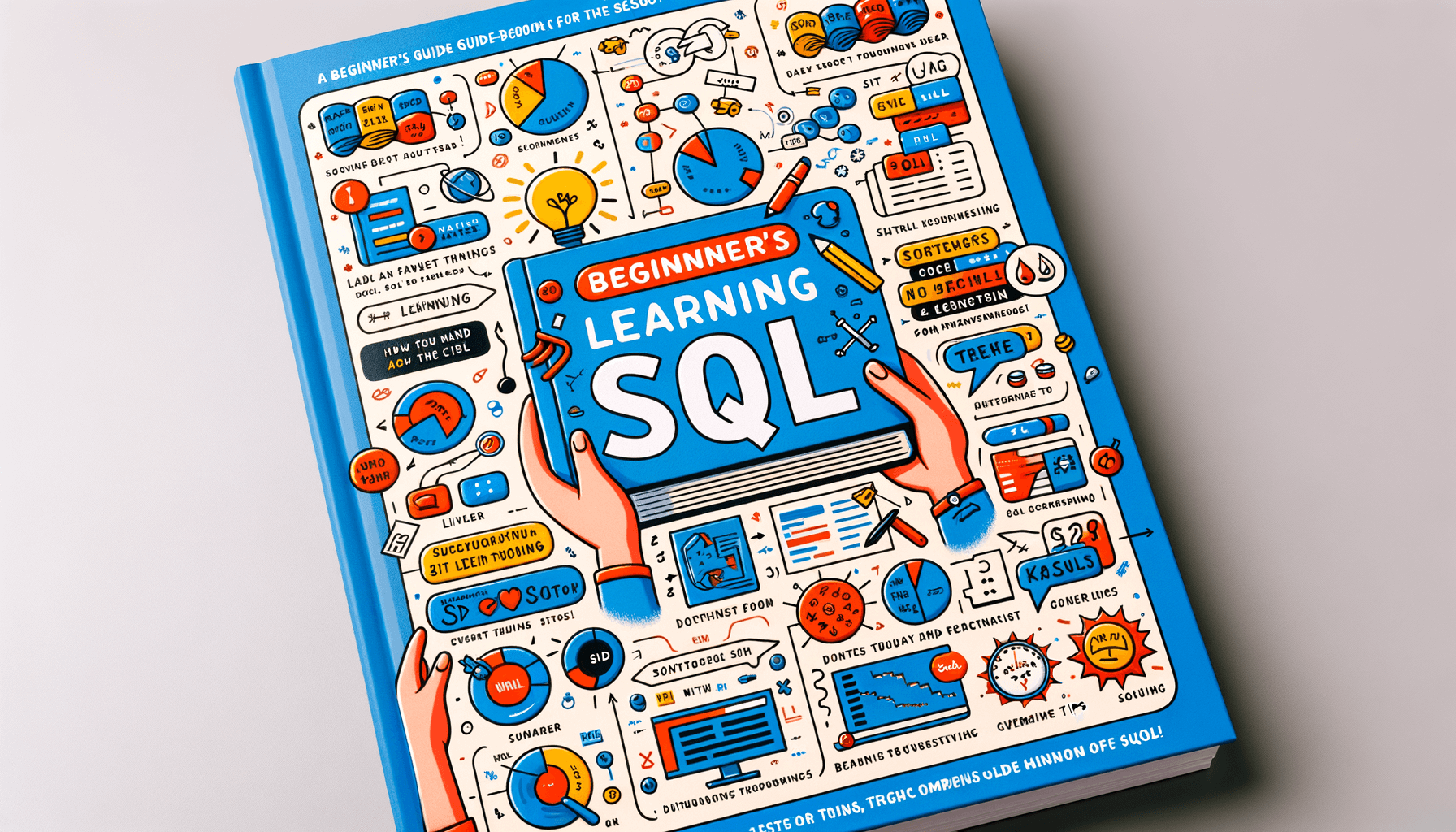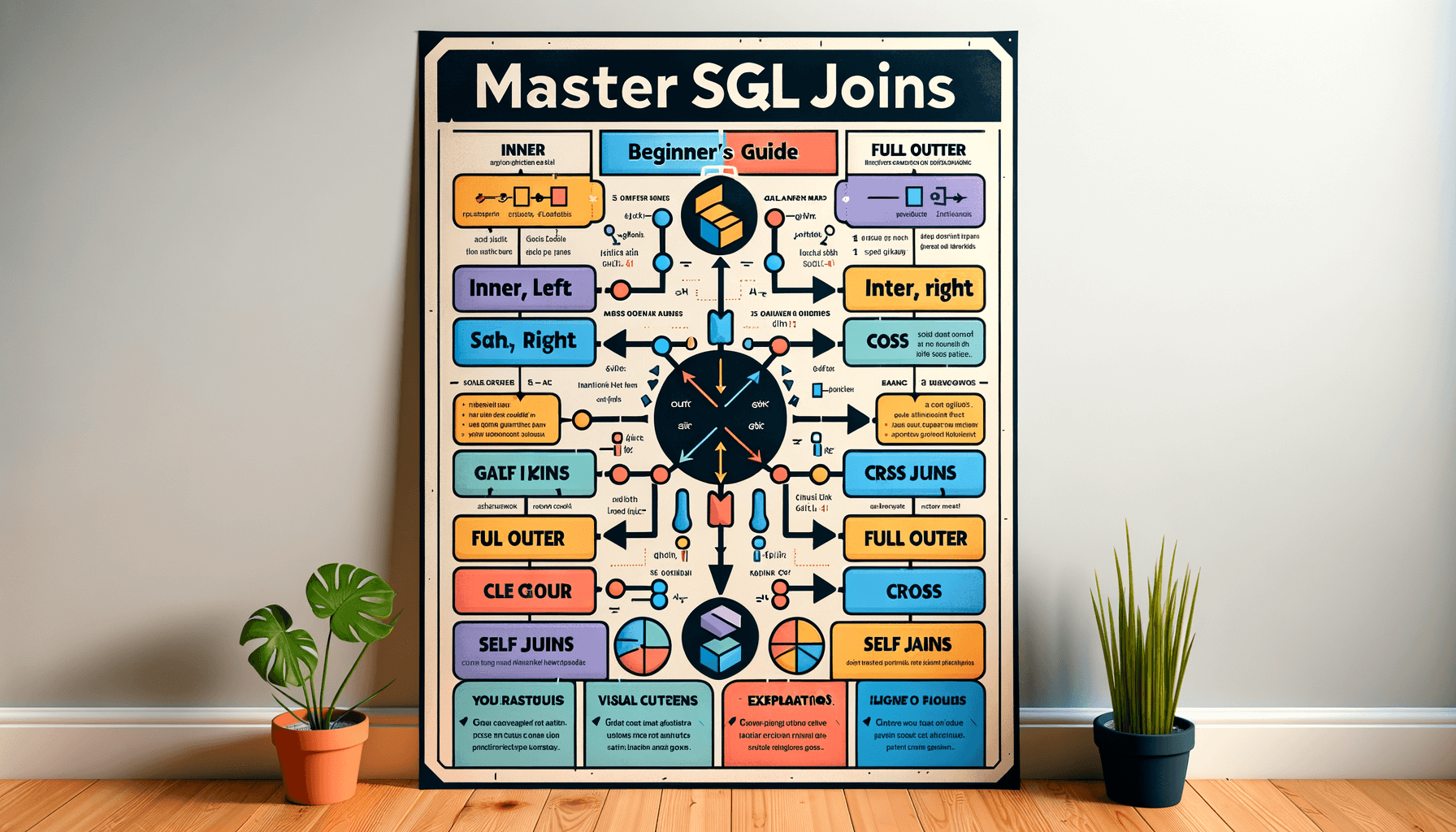A big variety of articles and resources

Mastering SQL: A Comprehensive Guide to Learning SQL for Data Analysis
 Sia Author and Instructor
Learn SQL
Sia Author and Instructor
Learn SQL
11 minute read
Understanding the Importance of SQL in Data Analysis
SQL is essential for data analysis, enabling data professionals to glean insights from their data. With SQL, you can interact with various database systems to query, filter, and manipulate data for analysis. Mastering SQL queries and techniques will greatly enhance your data analysis capabilities and efficiency.
Getting Started with SQL: Basic Concepts and Syntax
Embark on a journey that begins with the basics of SQL, understanding its importance and foundational role in data analysis. Early chapters are designed to build a solid groundwork, introducing SQL syntax, basic queries, and data manipulation techniques in a manner that is accessible to beginners and valuable for refreshing the knowledge of seasoned professionals.
For a quick start to databases: learn SQL basics quickly. Dive into first SQL queries, understand syntax, master basic operations, data retrieval techniques, conditions, sorting, filtering, and common SQL functions.
Introduction to SQL Syntax
SQL syntax allows users to create, manipulate, and query data within databases, spanning across various platforms such as MySQL, SQLite, Oracle, Microsoft SQL Server, or PostgreSQL. With SQL, data analysts can write simple to complex queries, filter data, perform calculations, and even integrate with other technologies to carry out advanced techniques and optimizations.
Basic SQL Commands Every Analyst Should Know
Understand the Fundamentals: Before diving into complex queries, ensure you have a solid understanding of SQL's basic syntax and operations. This includes knowing how to properly use SELECT, FROM, WHERE, JOIN, and GROUP BY clauses. Resources like SQLPad offer interactive tutorials on these fundamentals.
Setting Up Your SQL Environment
Mastering the basics of SQL is an essential skill for anyone looking to manage, analyze, and manipulate data effectively. This comprehensive guide has provided you with the foundational knowledge and practical exercises needed to get started on your SQL journey. By understanding the core concepts and practicing regularly, you can build a strong foundation that will serve you well in various data-related roles. Remember, the key to mastering SQL is consistent practice and continuous learning. With the right resources, such as sqlskillz.com vs w3schools.com: master sql basics, perfect for beginners, learn at your own pace. no credit card required. login or sign up to start learning.
Advanced SQL Techniques for Data Analysis
Using SQL Joins for Complex Queries
SQL joins are essential for combining data from multiple tables, enabling more complex and insightful queries. Mastering different types of joins—such as INNER JOIN, LEFT JOIN, RIGHT JOIN, and FULL OUTER JOIN—can significantly enhance your data analysis capabilities. For example, INNER JOIN returns only the rows that have matching values in both tables, while LEFT JOIN returns all rows from the left table and the matched rows from the right table.
Implementing SQL Aggregations for Summarizing Data
Aggregations are powerful for summarizing large datasets. Functions like COUNT, SUM, AVG, MIN, and MAX allow you to quickly derive meaningful statistics. For instance, you can use the COUNT function to determine the number of entries in a dataset or the AVG function to find the average value of a particular column. Grouping data using the GROUP BY clause can further refine these summaries.
Creating and Managing SQL Views and Stored Procedures
SQL views and stored procedures can simplify complex queries and improve code reusability. Views act as virtual tables, providing a way to save and reuse SQL queries. Stored procedures, on the other hand, are precompiled SQL statements that can be executed as needed, offering a way to encapsulate logic and improve performance.
Advanced SQL skills aren’t just about functionality — you need performance too. Slow queries can cripple analysis. Techniques like indexing and query optimization are crucial for maintaining efficiency.
Optimizing SQL Queries for Performance
Efficiency is paramount when dealing with large datasets, making the optimization of SQL queries a critical skill. The goal is to minimize execution time and resource consumption, ensuring swift, responsive data analysis. Strategies for query optimization include:
Understanding Query Execution Plans
To ensure your SQL queries run efficiently, it's crucial to focus on optimizing query performance. One of the most effective ways to achieve this is by using indexing. Indexes can significantly speed up data retrieval, but they should be used judiciously to avoid unnecessary overhead. Additionally, always aim to write queries that minimize the number of rows processed.
Indexing Strategies for Faster Queries
As data volumes explode, the efficiency of SQL queries becomes paramount. Optimizing SQL queries is not just about speed; it's about scalability and sustainability of data-driven projects. Indexing is a primary tool in this endeavor, drastically reducing query times by allowing the database to pinpoint data without scanning each row.
Best Practices for Writing Efficient SQL Code
Advanced SQL skills aren’t just about functionality — you need performance too. Slow queries cripple analysis. Techniques for optimizing SQL query performance include:
- Indexes — Improve filtering and JOINs. But beware of “index overuse” — Indexes make it faster to search tables, but longer to write to. Having unused indexes will end up causing some unnecessary slowdown.
- Partitions — Break up large datasets into partitions. Parallelize operations.
In the world of big data and data science, optimizing SQL queries is essential for improving performance and speeding up data analysis processes. As a data analyst, I always focus on writing efficient SQL queries to make the most of my time and computational resources. In this section, I’ll share a few tips and techniques that have helped me enhance my SQL skills for data analysis.
Integrating SQL with Other Data Analysis Tools
SQL's true potential is unlocked when it's seamlessly integrated with other data science and analytics tools. A prime example of this is the integration of SQL with Python for advanced data analysis. Using libraries such as Pandas, data scientists can pull data directly from SQL databases into Python for further manipulation, analysis, and visualization. This synergy allows for more sophisticated data manipulation techniques and deeper insights.
Combining SQL with Python for Data Analysis
SQL integrates seamlessly with many data science tools and environments, such as Python (via libraries like SQLAlchemy or Pandas), R, and data visualization tools like Tableau. This integration allows for efficient data extraction and manipulation directly from databases into analytical workflows.
Using SQL with Data Visualization Tools
Similarly, SQL's integration with visualization tools like Tableau or PowerBI transforms raw data into interactive and insightful visual reports. These tools can connect directly to SQL databases, enabling real-time data analysis and reporting. This integration facilitates a holistic view of data, making it easier for stakeholders to make informed decisions.
SQL in Machine Learning Workflows
The combination of SQL with other tools enhances its utility, making it a powerhouse in the data science toolkit. For those interested in exploring mini course: sql data manipulation tools. dive into sql grouping, filtering, and data preparation. gain advanced analytical skills and project readiness for real-world data science challenges.
Practical Exercises to Master SQL Skills
Hands-On SQL Projects for Beginners
To build a strong foundation in SQL, start with hands-on projects that cover basic concepts such as data retrieval, filtering, and sorting. Practice regularly to reinforce your understanding. Here are some beginner-friendly project ideas:
- Create a simple database for a library system, including tables for books, authors, and borrowers.
- Develop a basic inventory management system for a small business.
- Design a student database to track grades, attendance, and personal information.
Intermediate SQL Challenges
Once you're comfortable with the basics, move on to more complex challenges that involve multiple tables and advanced queries. Participate in SQL challenges on platforms like HackerRank and LeetCode to sharpen your skills. Some intermediate-level exercises include:
- Writing queries to analyze sales data and generate reports for different time periods.
- Creating complex joins to combine data from various sources for comprehensive analysis.
- Implementing subqueries to solve nested query problems.
Advanced SQL Scenarios for Real-World Applications
For those looking to master SQL, tackle advanced scenarios that mimic real-world applications. These exercises will test your ability to handle large datasets and optimize query performance. Consider the following advanced projects:
- Developing a recommendation system based on user behavior and preferences.
- Building a data warehouse to consolidate and analyze data from multiple sources.
- Optimizing queries for performance in a high-traffic e-commerce database.
Consistent practice and tackling progressively challenging exercises are key to mastering SQL. Engage with real-world datasets and scenarios to enhance your problem-solving skills and deepen your understanding of SQL.
Resources for Continuous SQL Learning
Continuous learning and practice are pivotal in keeping up with the evolving SQL landscape. Here's how you can stay ahead:
Recommended Books and Online Courses
Online Courses: Platforms like Coursera and Udemy offer comprehensive SQL courses tailored for beginners to advanced users. Look for courses with high ratings and reviews that focus on SQL for data science, such as 'SQL for Data Science' on Coursera.
Books: For those who prefer self-study through textbooks, 'SQL in 10 Minutes, Sams Teach Yourself' is an excellent starting point. It breaks down SQL concepts into manageable lessons, ideal for busy professionals.
SQL Communities and Forums
Engaging with SQL communities and forums can provide valuable insights and support. Websites like Stack Overflow, Reddit, and specialized SQL forums are excellent places to ask questions, share knowledge, and stay updated on the latest trends.
Keeping Up with SQL Updates and Trends
To stay current with SQL updates and trends, subscribe to a blog page with a focus on SQL learning resources. These often include comprehensive guides, cheat sheets, and courses. Regularly updating your knowledge base is crucial.
Remember, the key to mastering SQL is consistent practice and continuous learning. With the resources and tips provided in this guide, you are well-equipped to take your SQL skills to the next level. Happy querying!
Unlock your potential with our comprehensive SQL courses designed to enhance your technical skills and career prospects. Whether you're a beginner or looking to refine your abilities, our expert-led modules and AI-assisted learning will guide you every step of the way. Don't wait—start your journey to becoming a SQL specialist today!
Conclusion
Mastering the basics of SQL is an essential skill for anyone looking to manage, analyze, and manipulate data effectively. This comprehensive guide has provided you with the foundational knowledge and practical exercises needed to get started on your SQL journey. By understanding the core concepts and practicing regularly, you can build a strong foundation that will serve you well in various data-related roles. Remember, the key to mastering SQL is consistent practice and continuous learning. Whether you're taking your first steps into the world of data analysis, looking to solidify and expand your SQL knowledge, or aiming to integrate SQL into advanced data science workflows, this guide is your indispensable companion. Join us on this journey and transform your data analysis skills, unlocking new opportunities and gaining a competitive edge in the data-driven world.
Frequently Asked Questions
What is SQL and why is it important for data analysis?
SQL, or Structured Query Language, is a programming language designed for managing and manipulating relational databases. It is essential for data analysis because it allows analysts to efficiently query, update, and manage large datasets, making it easier to extract valuable insights from data.
How can I get started with learning SQL?
To get started with SQL, you can begin by learning the basic syntax and commands such as SELECT, INSERT, UPDATE, and DELETE. There are many online resources, tutorials, and courses available that can guide you through the basics. Setting up a local SQL environment or using online SQL editors can also help you practice your skills.
What are some common use cases of SQL in data analysis?
Common use cases of SQL in data analysis include querying databases to retrieve specific information, performing data aggregations to summarize data, joining multiple tables to combine data from different sources, and creating views and stored procedures to streamline complex queries.
How does SQL compare to other data analysis tools?
SQL is unique in its ability to directly interact with relational databases, making it highly efficient for querying and managing structured data. While other tools like Python, R, and Excel offer powerful data analysis capabilities, SQL remains a fundamental skill for database management and is often used in conjunction with these tools for comprehensive data analysis workflows.
What are some advanced SQL techniques for data analysis?
Advanced SQL techniques for data analysis include using complex joins to combine data from multiple tables, implementing aggregations to summarize data, creating and managing views and stored procedures for reusable queries, and optimizing SQL queries for better performance through indexing and execution plan analysis.
How can I continuously improve my SQL skills?
Continuous improvement in SQL can be achieved by regularly practicing SQL queries, taking on more complex data analysis projects, participating in SQL communities and forums, and staying updated with the latest SQL features and best practices. Reading books, taking advanced courses, and following industry blogs can also help enhance your SQL knowledge.
Related Articles

Mastering Data Management: Learn SQL Language Today
9 minute read

A Beginner's Guide: How to Learn SQL Effectively
8 minute read

Mastering Data Relationships: Learn SQL Joins for Beginners
10 minute read


